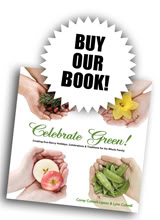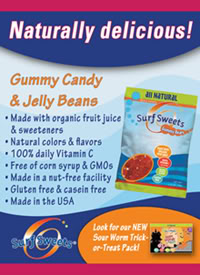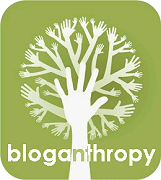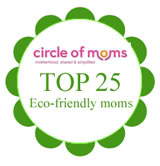Review: The Smarter Science of Slim
As time has gone on, it’s become more and more clear that human health is linked to the health of the planet. And obesity is a problem that gets in the way of our health. Hence, the interest from more than a personal perspective, on choosing to eat in healthier ways that help us avoid obesity-related diseases and problems.
While The Smarter Science of Slim can in no way be considered an environmentally focused book, when we link our health to that of the planet, much of what it contains is worth considering for us greenies.
I first met Jonathan Bailor, author of The Smarter Science of Slim, when he asked us to run a giveaway with his company, Camera Renter. As we talked, I discovered he also was working on a book. In fact, he’d been researching the science behind weight loss for 20 years.
What he discovered is that almost everything we believe to be true about losing weight is, when viewed strictly from a scientific perspective, wrong.
I’ll say up front that I’ve had to work through weight issues my entire life. As a result I’m well-versed in diet lingo and mindset, the premiere directive being, “calories count.”
To read that really, they don’t, is somewhat earthshaking.
To believe that we need to exercise to the point of exhaustion in order to lose weight, then discover that we don’t, is a challenge for my aging brain to accept.
In fact, as I read The Smarter Science of Slim, I found myself often thinking, “Yes, but…”
Yes, but I have lost weight by eating fewer calories and exercising a lot. Many times.
I’ve also lost weight eating many of the foods that Bailor’s research shows hamper the weight loss process.
And what about those people on The Biggest Loser? Eating less and exercising more certainly seems to work for them. (And many of them do keep it off.)
One of the prime discoveries of my life so far is to realize that there are no absolutes. Bailor’s research and conclusions are impossible for me to dispute. (He analyzed more than 10,000 pages of academic research related to diet, exercise and weight loss.)
Yet my own, admittedly anecdotal years of experience, run counter to many of his discoveries.
How to resolve the seeming dichotomy-science versus experience?
I don’t need to.
I take and learn from all available sources, then apply what works for me.
Besides, as Jonathan points out, “Eating a SANE diet is not about being perfect. It’s about finding the right balance for each individual between the pleasure of eating certain food and the pleasure of a certain level of health and fitness. There is not one right answer here. The goal of my book is simply to give people the information necessary to choose whichever pleasure is more important to them.”
I’ve reached the point when preserving my health takes precedence. Yes, being at a good and stable weight is a huge part of being healthy. But getting there by eating foods that may be detrimental to me on a variety of levels is just not the way to go any more.
Sure, I can lose weight eating nothing but packaged low-calorie meals. (I’ve done it.) But what is in those “foods?” And from the sustainability perspective, who am I supporting with my wallet when I buy them?
For me, The Smarter Science of Slim is less about convincing arguments for weight loss methodology, and more about living a healthier life based on good-for-me food choices.
From a scientific point of view, the most natural way to lose weight is to follow the plan Bailor outlines. (By the way, I’m doing it and of course, it works.)
Unfortunately, for a lot of people (including me), this plan is not the easiest to implement. Also, with its emphasis on animal protein, it is not the most sustainable.
None of this means the book isn’t worthwhile. It is!
Reading the research instead of what marketers (and even the U.S. government) wants us to believe, was fascinating. The book is chock full of charts and graphics that illustrate everything from “A Natural Balanced Diet vs. the Typical U.S. Diet,” to “Food Quality vs. Profitability.”
This is not a diet book. If you’re looking for a quick fix, lose-10-pounds in a week method, you’ll be disappointed.
But if you, like me, are interested in the science behind weight loss, plus a healthy, albeit challenging, alternative to the ways you’ve tried to lose weight in the past, The Smarter Science of Slim is a fascinating read.
The “diet” plan, as I said, will be a challenge for many. It moves us away completely from packaged foods and many types of starches, while allowing “good” fats like that from avocado, nuts and seeds. If you’re already gluten-free, it may be easier for you.
I think that to follow this plan, you either need to love what you are allowed, or you need to be ready, as I am, to not only lose weight, but acknowledge (as much as I wish I didn’t have to), that in order to lose (and keep it off), I cannot routinely indulge in every food I love (all of which happen to be “in-SANE” as Jonathan would say). You have to be ready to bite the bullet and do what is best for your health regardless of the fact it may go against your longings, desires and addictions.
Personally I’ve found that once I’m on a plan for a few weeks, I miss what I’ve craved in the past, a lot less. Sometimes the cravings go away entirely.
But what really needs to change is my mindset. I don’t like to brush my teeth twice a day, but I do it. I don’t like to “waste” eight hours each night sleeping, but I do that too. For me, eating the proscribed way is like taking a prescription. If I want to live a long life enjoying the things that make that life worthwhile, I just need to do it.
For me, part of the problem is that I love to eat and I especially love everything that is not healthy for me. There is no veggie in the world that can take the place of coffee ice cream. No nut that could replace french fries. But If I were diagnosed with a disease that meant I could not eat sweets, I would cut them out. In order to get to my healthiest weight and maintain it, I need to focus on “getting and staying well.”
The Smarter Science of Slim is not a how-to diet book. It concentrates on the research and there is limited information about the implementation of the plan. For this, you’ll need the workbook (which has not yet been published, but which you can see here).
In addition, I’m waiting (not so patiently), for the app to come out. That will make shopping and sticking with the plan easier.
One more note: I would have loved to see included remarks about choosing organic and GMO-free. If you truly want to be healthy, organic fruits and vegetables (and no GMO’s) are a given. Even a reference to the Dirty Dozen and Clean 15 when it comes to choosing fruits and vegetables, would remind people that eating spinach drenched in pesticides isn’t the best idea when trying to move to a healthier way of life.
Overall, I give The Smarter Science of Slim, a top rating not only because the plan makes sense, but also because the research gave me plenty of food for thought!
Note: I received a copy of The Smarter Science of Slim at no cost in order to review it. For more information please see our Disclosure Policy.
If you’re a blogger and would like to receive a review copy of The Smarter Science of Slim, contact Jonathan.
Lynn Colwell and Corey Colwell-Lipson are mother and daughter and authors of Celebrate Green! Creating Eco-Savvy Holidays, Celebrations and Traditions for the Whole Family, and founders of Green Halloween®.

























